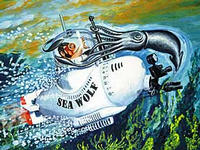| Thursday, April 24, 2003 |  |
|
|
|
 Tomalak mentions Leonardo da Vinci, Disciple of Experience, a brief article by Mark Hurst on Good Experience, about how da Vinci was a man of direct experience, dedicated to perceiving and experiencing things directly, as opposed to just talking about them academically. Tomalak mentions Leonardo da Vinci, Disciple of Experience, a brief article by Mark Hurst on Good Experience, about how da Vinci was a man of direct experience, dedicated to perceiving and experiencing things directly, as opposed to just talking about them academically.The sketches, of course, were beautiful. But what really struck me was the sheer breadth of this one man's talents. da Vinci wrote treatises on physics, anatomy, astronomy, warfare, art, and other topics. Without a formal education, da Vinci never mastered Latin, the language in which academic treatises were written at that time. Some scholars dismissed his work.
da Vinci replied that he was a "disciple of experience": "[They may say] I'm a man without learning, [but] I will cite something far more worthy, quoting experience..." In another essay, da Vinci writes that ...the subjects I am dealing with are to be dealt with by experience rather than by words, and experience is the muse of all who write well. And so, as my muse, I will cite her in every case. 500 years ago, da Vinci understood the power of experience. Academic pedigree is fine, but a direct grasp of experience is essential. Analyzing and learning from direct experience is innately more powerful than hiding behind obscure academic methods. da Vinci "got it." Maybe he was the first.
500 years later, there are still those academics whose frameworks, methods, and terminology talk *about* experience but don't help much in bringing people to an understanding of the experience itself. Remember the Italian scholars who were so concerned with da Vinci's knowledge of Latin (the "method" of the day) that they completely missed (or dismissed) his genius - and didn't help others to see it. Ah, yes, there's no better teacher than direct experience with your own senses. But it isn't always what is most fashionable.
[ Knowledge | 2003-04-24 13:56 | | PermaLink ] More >
|
|
|
|
 Wired has an editorial by Graham S. Hawkes suggesting a NASA for the exploration of the deep oceans. It has been noted many times that our oceans contain more mysteries and are more uncharted than is the Moon or Mars. And they're so much closer. Wired has an editorial by Graham S. Hawkes suggesting a NASA for the exploration of the deep oceans. It has been noted many times that our oceans contain more mysteries and are more uncharted than is the Moon or Mars. And they're so much closer.About 94 percent of life on Earth resides in the oceans. We've seen only about 2 percent of this vast ecosystem - the uppermost layer (home to fish, whales, scuba divers, and most known marine life). Beneath this warm lens lies a cold, dark, and life-rich realm of grand proportions. It's home to creatures as far removed from the sun and human biology as any alien imagined by science fiction.
We've seen some of these organisms clustering around midocean thermal vents - small undersea volcanoes that spew 400-degree water spiked with toxic chemicals. Thriving in total darkness, under 8,000 psi of ambient pressure, these organisms possess metabolic processes fundamentally different from ours. The ones we know about rely on chemosynthesis, using sulphides and other chemicals from Earth's core to convert seawater into food. That's about as alien as it gets. There's potentially huge resources there, and discoveries waiting to be made in how life works, in new kinds of DNA.Currently, the entire US scientific community shares a single, 12-year-old submersible named Alvin. With just one Alvin, long-range exploration is nearly impossible. Alvin doesn't even know where to go because we don't have a decent map. The latest ocean charts rely on satellites to detect the sea-level changes wrought by the gravitational pull of underlying topography. This gives us a crude sketch that's essentially useless without hands-on exploration. We can't begin to mine the sea's minerals or harvest DNA unless we go deep, with a fleet of sea exploration vessels. We need a national agency with the stated goal of exploring, mapping, and studying the oceans.
Japan is already there, having created the Japan Marine Science and Technology Center, which secures rights to deep-sea minerals, territories, and potential food sources. Its Deep Star program has even taken an early lead in DNA recovery: It's already working with the biotech industry to develop pharmaceuticals. Meanwhile, we're still combing the rain forests and wishing upon a star. Well, maybe it isn't all that terrible that the U.S. hasn't figured out how to exploit the resources of the oceans. That keeps them somewhat intact. Or just accessible to nations that are more concerned about the environment than the U.S. regime.
[ Nature | 2003-04-24 17:46 | | PermaLink ] More >
|
|
|
|
Many people I know are at O'Reilly's Emerging Technology conference in Santa Clara right now. Or rather, pretty much ALL the a-list tech bloggers are there. And I feel a bit left out, as they're talking about many things I'm into. But I just can't defend spending a couple of thousand dollars going to a conference for three days, even if I could squeeze it out of my budget. I'm sorry, I only make 100K per year. Well, last year, when my economy was looking better, I did set myself the target of going to a conference or so per month. And each time that would usually end up costing close to 1000 dollars total, including air plane tickets, hotels, etc. The typical conference I go to would, if it wasn't free, be $2-300. I just can't even wrap my mind around paying even $995 (the early bird, several months in advance price), let alone $1600, just for the conference itself. For sitting on a chair and listening to some people talk, and for the opportunity of meeting some people in the hallway. Oh, great talks and great people that I would like to hang out with, but it somehow doesn't add up. Of course my great visionary tech acquaintances mostly aren't paying for being there, because they're the speakers, or they're journalists. I suppose it is geared towards corporate folks who come to hear what these guys have to say. Anyway, other people seem to have something to say on the money thing too: here, here and here
[ Diary | 2003-04-24 22:50 | | PermaLink ] More >
|
|
|
|
 The Dixie Chicks apologized for being disrepectful to George Bush by saying that they were ashamed of being from Texas at a recent European concert. They shouldn't have apologized. I'm ashamed of even living in a country that will tolerate such a wacko as its president. Shame is certainly the right word. And I'm not even an American. And all the right-wing redneck stormtroopers responded by burning their albums, banning their music on southern radio stations, and coming up with a long list of slurs about them. Well, at least they can maintain their stance against war and for peace. And make a bit light of the whole thing, as in this nude magazine cover. The Dixie Chicks apologized for being disrepectful to George Bush by saying that they were ashamed of being from Texas at a recent European concert. They shouldn't have apologized. I'm ashamed of even living in a country that will tolerate such a wacko as its president. Shame is certainly the right word. And I'm not even an American. And all the right-wing redneck stormtroopers responded by burning their albums, banning their music on southern radio stations, and coming up with a long list of slurs about them. Well, at least they can maintain their stance against war and for peace. And make a bit light of the whole thing, as in this nude magazine cover.
[ Politics | 2003-04-24 23:03 | | PermaLink ] More >
|
|
 Tomalak mentions Leonardo da Vinci, Disciple of Experience, a brief article by Mark Hurst on Good Experience, about how da Vinci was a man of direct experience, dedicated to perceiving and experiencing things directly, as opposed to just talking about them academically.
Tomalak mentions Leonardo da Vinci, Disciple of Experience, a brief article by Mark Hurst on Good Experience, about how da Vinci was a man of direct experience, dedicated to perceiving and experiencing things directly, as opposed to just talking about them academically. Wired has an editorial by Graham S. Hawkes suggesting a NASA for the exploration of the deep oceans. It has been noted many times that our oceans contain more mysteries and are more uncharted than is the Moon or Mars. And they're so much closer.
Wired has an editorial by Graham S. Hawkes suggesting a NASA for the exploration of the deep oceans. It has been noted many times that our oceans contain more mysteries and are more uncharted than is the Moon or Mars. And they're so much closer. The Dixie Chicks apologized for being disrepectful to George Bush by saying that they were ashamed of being from Texas at a recent European concert. They shouldn't have apologized. I'm ashamed of even living in a country that will tolerate such a wacko as its president. Shame is certainly the right word. And I'm not even an American. And all the right-wing redneck stormtroopers responded by burning their albums, banning their music on southern radio stations, and coming up with a long list of slurs about them. Well, at least they can maintain their stance against war and for peace. And make a bit light of the whole thing, as in this nude magazine cover.
The Dixie Chicks apologized for being disrepectful to George Bush by saying that they were ashamed of being from Texas at a recent European concert. They shouldn't have apologized. I'm ashamed of even living in a country that will tolerate such a wacko as its president. Shame is certainly the right word. And I'm not even an American. And all the right-wing redneck stormtroopers responded by burning their albums, banning their music on southern radio stations, and coming up with a long list of slurs about them. Well, at least they can maintain their stance against war and for peace. And make a bit light of the whole thing, as in this nude magazine cover.